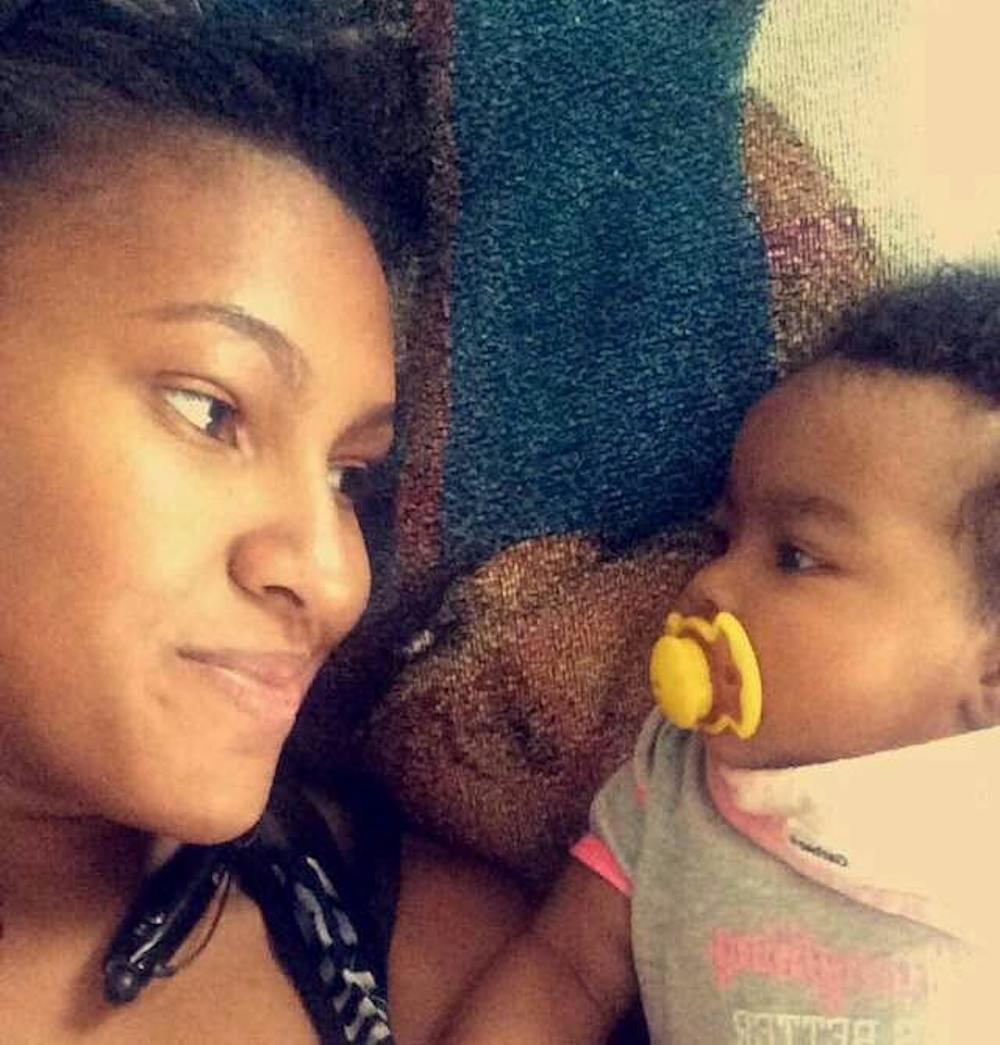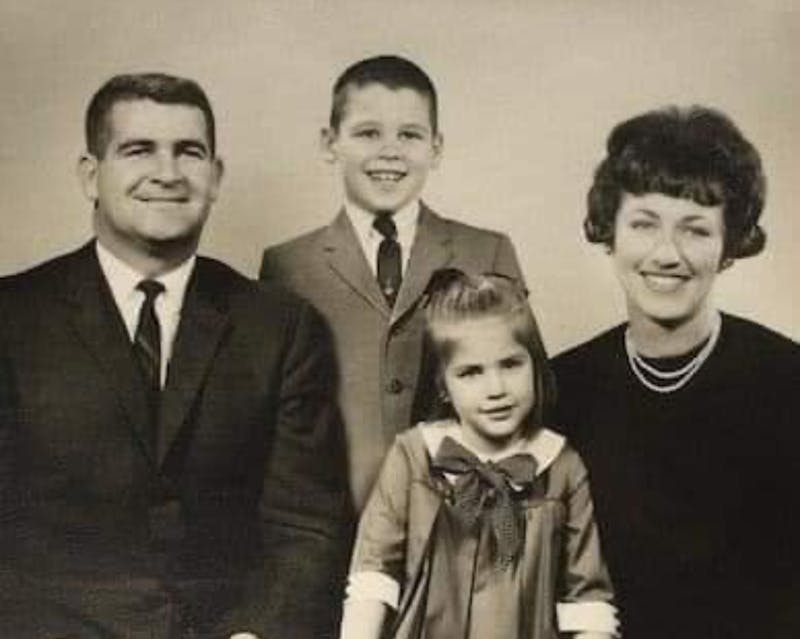A wad of spit comes flying through the air, landing smack dab in your face. On the other side of the gob stands an angry little girl. You are upset, but do not react. After school you tell your mother about the incident, crying and asking why something like this would happen. Then the answer hits you — the little girl was white, and your skin is anything but that.
More than 10 years later, Shippensburg University student Yvette Betancourt, now 21 years old, can recognize and rise above racism when she is forced to face it. Underneath her clear, almond-brown skin a myriad of cultures runs through her veins. From her mother’s side, she is African-American and Caucasian. On her father’s side, she is Portuguese, Venezuelan and Trinidadian.
Betancourt has made it her mission to learn as much as she can about all aspects of her heritage. She loves celebrating each facet of her family’s culture. She grew up as the youngest out of five, whose siblings are most proud of their African-American roots.
“We incorporate everything about us into everything we do,” Betancourt said.
During Christmas they will feast through a variety of platters, like soul food, Caribbean cuisine, Hispanic dishes and Puerto Rican eggnog. Special occasions in the Betancourt household often call for a wide-range of cooking.
As she talks about her family and their traditions, Betancourt’s dark brown eyes begin to dance and her light pink nails shine as she moves her hands, giving life to her words. An airy white blouse covers her torso; tied at the waist it meets the brim of a pair of dark jeans, which end at the top of fluffy socks peeking out above her sneakers.
Finding a home at college
Although Betancourt has encountered racist people time and time again, she does not let the bad experiences keep her down. At SU, where she studies communication/journalism and international studies, Betancourt works at The Slate newspaper as Ship Life editor. She also serves as a mentor to the Martin Luther King (MLK) Academic Retention Program. She started in the program in her first year at SU. The goal of the program is to foster a community of learning for students of diverse backgrounds, whether they are the first in their family to attend college, or identify as a person of color.
This past semester, Betancourt had eight mentees through the MLK program. As a mentor, she helps guide them through the tumultuous tides of starting college.
“I teach them not to overthink and stress so much because it’s not healthy and it’s not going to do you any good,” Betancourt said.
For many students, the first semester of college can be overwhelming, and having the support of the MLK program can make the transition easier, like it did for Betancourt.
“It gave me someone to talk to,” Betancourt said.
SU is host to a variety of multicultural student groups, like the African-American Organization, Multicultural Student Affairs, the Latino Student Organization and more. The university is just a little over 100 miles from Betancourt’s hometown of Brodheadsville, Pennsylvania. The proximity of SU to Betancourt’s home was an important factor in her decision to attend.
Her mother, who she is named for, has health issues and Betancourt wanted to be able to get home quickly, in case of an emergency. Betancourt is also very close to her siblings and their children, particularly her 6-year-old nephew, David.
David has the unique tendency to notice race and skin color, when most children his age do not even think about it. The first time he met Betancourt’s former boyfriend, Chad Fogelsanger, who is Caucasian, David said, “You’re so different.” Betancourt scrunched up her face as she told the story, raising the pitch of her voice to sound like her young nephew, innocently pointing out the obvious difference between himself and Chad.
Growing pains
Betancourt hopes to have children of her own some day, specifically two sets of twins. Growing up, Betancourt felt that her parents tried to shield her from the ugliness of racism and she hopes she can prepare her future children for the obstacles they might face. Betancourt felt like she was not ready when she had her first encounters with racism.
“If I have kids, and they’re boys, and they look black, I’m going to be afraid for them,” Betancourt said. “Honestly, I’m horrified for my nephew now.”
When you consider the fatal shootings of African-American children by police, Betancourt’s stance does not seem overly protective. In 2012, 17-year-old Trayvon Martin was shot to death in Sanford, Florida. The shooter claimed he was acting in self-defense and found not guilty, CNN reports.
Tamir Rice, 12, was shot and killed in Cleveland, Ohio by police in December 2014 when he was playing outside with a toy gun. The dispatcher said the suspect appeared to be a juvenile with a fake gun, but the crucial information was not relayed to police, according to the Chicago Tribune. In 2015, police killed at least 102 unarmed black people in the United States, according to mappingpoliceviolence.org. The recent deaths of Alton Sterling, in Baton Rouge, Louisiana, and Philando Castile, in Falcon Heights, Minnesota, add to that number.
Since the spitting incident in elementary school, Betancourt has faced even more acts of racism in her life. Betancourt works at Wal-Mart Stores Inc. in Shippensburg, and has been since March of her freshman year. Her work ethic impressed her boss and she is now being trained to become a supervisor. However, some patrons of Wal-Mart only recognize her skin color, instead of her work ethic.
“I’ve actually had people call me [racial slur deleted] to my face,” Betancourt said.
Many times, Betancourt bites her tongue and lets the situation roll off her back. One time, a customer came through her line at the register while wearing a Confederate flag hat and shirt. He pulled his hat further down his face to draw attention to it and stretched his torso so the shirt design was clearly visible. Betancourt does not usually have a problem with the Confederate flag, but she felt that this customer was purposely trying to get a hateful message across.
“People are so simple-minded that I’ve gotten used to it,” Betancourt said.
Living in a box
Oftentimes, people assume what Betancourt’s race is, based on her physical features. Their guess is usually wrong. Even the government cannot get it right.
When Betancourt fills out official forms for the government, she needs to mark her race. She is faced with a series of predetermined boxes that are supposed to encompass all that she is.
“Other,” Betancourt said, answering the question before it can be asked. “I have no choice but to put ‘other,’ really.”
Even with the option, two or more races, forms usually say “non-Hispanic” in parentheses afterward. Betancourt would fall under the category, two or more races, but she is also Hispanic, which leaves her with one option — other. She is not content with the restriction. It is prejudiced and simple-minded, in her opinion.
“You can’t narrow someone’s identity like that,” Betancourt said.
The U.S. Census occurs every 10 years. It was just in 2000 that the census first offered the option to select more than one race, according to censusscope.org. More than 6.8 million Americans selected this option, making up 2.4 percent of the population, at the time. In 2010, the number of recorded biracial and multiracial Americans rose to 9 million, according to the U.S. Census. In 1990 and earlier, there were most likely millions of Americans selecting only one of their races for the census because they did not have another option.
Outside of paperwork boxes, Betancourt faces another restriction — society’s expectations. While interracial couples are considered fairly common in modern-day, Betancourt still noticed people staring at her and her white boyfriend. They received double takes from strangers, and sometimes, disgusted looks. But they also received encouragement from people who understood that their relationship could not be easy.
Faith and forgiveness
Betancourt found support, and fellowship, from her church, Big Spring Heights Church of God, in Newville. Betancourt’s faith has always been very important to her, and finding the right church near college was a long journey.
“I feel closer to God when I’m there,” Betancourt said of her church.
Raised in a Christian household, Betancourt and her family seek God as an answer to all that occurs. But at the same time, Betancourt strongly believes in the rights of other religions and supports marriage between all couples.
In social media, some people have said that the opposition toward gay marriage today is reminiscent of when people of different races could not marry each other. Interracial marriage was not legal in the U.S. until 1967 — less than 50 years ago. There are many elderly people alive today who remember this time.
Elderly people are the most likely to be racist, in Betancourt’s experience, because of the time they grew up in. However, Betancourt does not harbor hate against these people, or anyone, it seems.
“Even with racist people, I don’t always fully blame them,” Betancourt said. “I blame who raised them and the lifestyle they were brought up with, and it hurts my heart and it makes me feel bad for them.”
Despite the injustices in Betancourt’s life, she finds a way to forgive the actions of cruel people. Her parents raised her with a Christian mindset, and hoped to protect her from the harsh reality of the world.
“Them trying to shield me from it didn’t necessarily help me, but at the same time, they taught me to love myself,” Betancourt said of her parents, Yvette and David.
Looking toward her senior year of college and the distant future, Betancourt can hardly place her finger on a single dream. She can see herself writing press releases for the U.N., planning weddings, or working as an editor at a newspaper. Betancourt can only say that she definitely wants to be a mother. She wants to instill a sense of reality in her future children, without harming their innocence.
“The world isn’t a perfect place, but it’s still beautiful,” Betancourt said.
One fact is certain — no child of Yvette Betancourt’s will be spitting in anyone’s face.



The Slate welcomes thoughtful discussion on all of our stories, but please keep comments civil and on-topic. Read our full guidelines here.